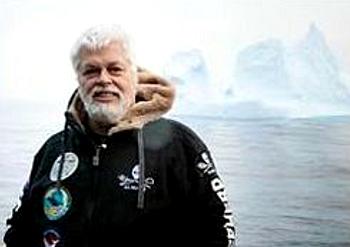
SEATTLE, Washington, November 7, 2013 (ENS) – “Protesting against illegal activity is not piracy,” Captain Paul Watson told a U.S. appeals court in Seattle on Wednesday.
Founder of the Sea Shepherd Conservation Society, which for the past nine years has disrupted Japanese lethal “research” whaling in the Southern Ocean, Watson told the court, “I don’t care what people call us. We’re not pirates.”
The 62-year-old Canadian eco-activist was responding to Chief Judge Alex Kozinski of the Ninth U.S. Circuit Court of Appeals, who called the Sea Shepherds pirates last December while handing down the injunction at issue in the Seattle courtroom this week.

Wearing a blue suit, blue shirt and yellow tie, Watson told the court Wednesday the Japanese whalers “are criminals.” He bases this characterization on the International Whaling Commission’s global moratorium on whaling that took effect in 1986.
Japan has assigned itself a quota of more than 1,000 whales a year in the Southern Ocean and more in the North Pacific. Japanese whalers have caught whales every year since 1987 in defiance of the moratorium.
Sea Shepherd’s direct-action interventions saved the lives of more than 3,600 whales in the first eight years of its campaigns, the organization claims on its website. The Sea Shepherd protest actions form the basis for the reality-TV series “Whale Wars” on the Discovery Channel’s Animal Planet.
Watson ended his 15 month-long exile at sea to testify at this hearing in a case brought by two large Japanese whaling companies and the Tokyo-based Institute for Cetacean Research in 2011. Funded by the Japanese government, the ICR organizes the Japanese “research” whaling program.
In 2012, U.S. District Judge Richard Jones in Seattle ruled in favor of Watson and the Sea Shepherd Conservation Society in the ICR lawsuit, declining to issue an injunction to stop the anti-whaling protests.
The ICR appealed, and Judge Jones’ decision was reversed by the Ninth U.S. Circuit Court of Appeals, which issued the injunction last December. The order enjoins Sea Shepherd and anyone acting “in concert” with the organization to keep at least 500 yards away from the Japanese whaling vessels.
The ICR alleges that the injunction was violated at least 10 times during the 2012-2013 whaling season.
If the court finds that Watson and the Sea Shepherd violated the injunction, they could be found in contempt of court, a finding that could carry fines of up to $2 million.
The ICR has said it will forgo the fines if the Japanese whaling fleet is able to operate next season without interference.
The director of the Australian Sea Shepherd Society has said it will conduct another anti-whaling campaign this coming season.
Watson was in the Southern Ocean during the 2012-2013 whaling season, but he says he was there onboard one of the four Sea Shepherd vessels only as “an observer.”

After the Seattle court’s injunction, Watson resigned from his position in the organization he founded in Vancouver, Canada in 1977 in an effort to comply. He says that even as a observer he urged compliance with the injunction.
Watson turned last season’s anti-whaling campaign over to Sea Shepherd Australia, where it was organized by former Australian Greens Senator Bob Brown and Jeff Hansen, executive director, Sea Shepherd Australia Limited.
Watson and Sea Shepherd take the position that an injunction issued by a U.S. court has no control over an Australian organization operating in international waters. Hansen testified before the Seattle appeals court earlier this week to that effect.
“We will continue to use the courts and the law to overturn these rulings,” Charles Moure, lead counsel with Harris & Moure of Seattle, which represents Watson and the Sea Shepherd, said in February. “We have a long, hard fight ahead of us but Judge Jones was correct when he said Sea Shepherd is working in the public interest for the greater good.”
“Sea Shepherd has the court of public opinion on its side, backed by thousands of supporters worldwide, something the Japanese whale poachers will never have,” said Moure. “The organization is prepared to take on these challenges, believing that in the end, justice will prevail and Judge Jones’ courageous opinion will become the law of the land.”
Watson’s legal position has eased somewhat since he was arrested in Germany in May 2012 on a warrant issued by Costa Rica over an incident in 2002 in which Sea Shepherd intercepted a shark finning vessel.
Watson jumped bail in July 2012 and fled Germany, remaining on a Sea Shepherd vessel at sea for 15 months until he came ashore in San Pedro, California last week to travel to Seattle for this hearing.
Costa Rica has rescinded its arrest warrant and lifted the Red Notice it filed against Watson at Interpol. Shark finning is now a crime in Costa Rica.
Germany has also lifted its arrest warrant for Watson.
However, Japan still has a Red Notice against Watson on file with Interpol. A Red Notice is not an arrest warrant, but a request for information about the whereabouts of an individual.
The three Sea Shepherd campaign vessels, the Steve Irwin, the Sam Simon and the Bob Barker, currently are berthed in Melbourne, Australia, where they host tours for the public while preparing to sail for the Southern Ocean for the 2013-2014 anti-whaling protest season.
Copyright Environment News Service (ENS) 2013. All rights reserved.
© 2013, Environment News Service. All rights reserved. Content may be quoted only with proper attribution and a direct link to the original article. Full reproduction is prohibited.
